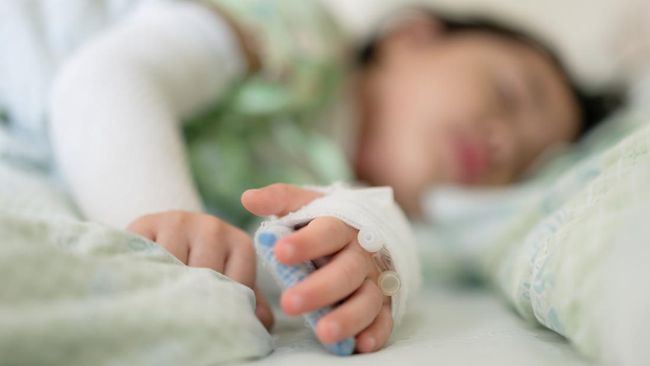
DDHK. ORG – Until now, from the data reported from Republik.co.id, there are at least 241 failed disturbances kidney mysterious acute kidney injury (AKI). Of the 241 cases of AKI, there were 133 deaths.
In DKI Jakarta, as revealed by the Head of the Epidemiological Surveillance and Immunization Section of the Department of Health DKI Jakarta Ngabila Salama, the case of Acute Kidney Injury Unknown Origin (AKIUO) as of Wednesday (26/10/2022) at 10.00 WIB, collected around 111 suspected cases of AKIUO.
This is the largest number of the total in Indonesia. The Ministry of Health received reports of AKI cases spreading to 22 provinces in Indonesia.
This disease appears suddenly and unexpectedly. AKI mainly affects infants under five years of age.
Causes of Acute Kidney Failure
The thing that makes it strange and unexpected is that the cause of acute kidney failure in children is due to drugs. Based on an official statement from the Minister of Health, Budi Gunadi Sadikin, acute kidney failure in children is caused by the presence of Ethylene Glycol (EG), Diethylene Glycol (DEG), and Ethylene Glycol Butyl Ether (EGBE) in the syrup.
The Minister of Health's statement after a long research since August 2022. Initially, this child's acute kidney failure was thought to be caused by bacteria, viruses, or parasites. The reason is, there is one bacterium that can cause kidney failure, namely leptospira.
But apparently, no bacteria, viruses, or parasites were found in patients with kidney failure in children. What exists is, in fact, chemical contaminants of syrup drug solvents.
Ethylon glycol is a solvent with a sweet taste. However, it is widely misused as a drug solvent. In fact, ethylene glycol is very toxic.
Quoted from the Centers for Disease Control and Prevention (CDC) page, the use of ethylene glycol can be for antifreeze, which is found in solvents, paints, plastics, to hydraulic brake fluid. This ethylene glycol can appear viscous at room temperature.
Due to the discovery of ethylene glycol, several types of syrups have been cited as the culprits. Of the many sample tests, the Food and Drug Supervisory Agency (BPOM) finally recalled five types of drugs called ethylene glycol.
One of the drugs that was withdrawn by BPOM was Unibebi children's syrup, owned by PT Universal Pharmaceutical Industries. BPOM stated that Unibebi's children's syrup contains ethylene glycol.
This statement does not make PT Universal Pharmaceutical Industries silent. This pharmaceutical company expressly states that the composition of the drug Unibebi has existed since the 1970s, and has been consumed by the Indonesian people for approximately 40 years, and there are no cases of drug-induced disease as reported today. PT Universal Pharmaceutical Industries also clearly stated that it had obtained a distribution permit that passed BPOM.
What PT Universal Pharmaceutical Industries has described is quite reasonable. The good name of a company that has been around for decades and has gained consumer confidence in its medicinal products is certainly at stake if it changes the composition of the drug properly. The company must have lost a lot.
Wonder indeed. Why do these highly toxic chemicals get contained in drugs, especially drugs for children?
Even though there is a safe threshold, what is called a 'toxic' chemical is still 'toxic'. Moreover, this liquid is used in paint to plastic. Knowing this, of course, makes parents 'horrified' to give medicine to their children.
The case of this child's acute kidney disorder also made parents afraid to give medicine to their child. It's safe, isn't it? There are no side effects, right? Questions like these will haunt parents because they start to doubt the medicine due to this case.
Not only that, this case also makes people question the credibility of BPOM as a supervisor who should prioritize people's safety. Moreover, medicine is not a trivial matter.
People may be able to anticipate by reading side effects and drug indications. However, ordinary people certainly do not understand the content of dangerous drugs and various other complicated pharmaceutical terms. Of course, the public can only rely on BPOM.
Government Response
President Joko Widodo asked his staff not to consider cases of acute kidney failure as a minor problem. According to him, public safety is a top priority.
Jokowi asked the Minister of Health (Menkes) to stop the circulation of drugs suspected of having content to cause acute kidney failure.
Jokowi emphasized that the temporary suspension was carried out until there were results of an investigation by BPOM.
Member of Commission IX DPR RI PKS faction, Kurniasih Mufidayati, asked the government, especially the Ministry of Health and BPOM to immediately take mitigation steps as soon as possible to anticipate the increasing prevalence of acute kidney failure cases in children.
After issuing an appeal for a ban on taking syrup drugs except for the list that has been declared safe by BPOM, other mitigation needs to be made so that the handling of this kidney failure case can be immediately controlled.
Kurniasih asked that the mitigation that should be done is to improve the centralized system of complaints and reporting. This system must be disseminated as widely as possible and made with easy access so that the public can quickly report suspected cases of acute kidney failure in children.
People who report to Health Facilities can also directly record their data to enter a centralized hotline. “This reporting system must be made proactive, lest the patient arrives in a severe condition. The process must be accelerated so that the handling can be faster and there are no unreported cases," Kurniasih said in a statement, Thursday (27/10/2022).
Another mitigation that needs to be done is alerting and preparing Type A and B Hospitals to receive patients and carry out treatment. Meanwhile, Type C Hospital is prepared to accept patients with AKI symptoms for initial and follow-up examinations, considering that the community is also filled with anxiety and worry, especially those who feel that they have given syrup medicine to their children.
Hospitals must be equipped with facilities and infrastructure, including medical personnel and medicines whose information has several alternatives imported from abroad.
Special Hospital for Kidney Failure
Following the rise of this case, the Tangerang City Government made a number of efforts to reduce the number of cases of kidney failure. One of the ways to do this is by providing a special hospital for the treatment of acute kidney failure.
Based on the records of the Tangerang City Health Office, as of Wednesday (26/10/2022) there were as many as six cases or six children experiencing acute kidney failure in Tangerang City. Four of them died from June to August 2022, one child has recovered, and one other child is still undergoing treatment.
Head of the Tangerang City Health Office, Dini Anggraeni, said that his party had designated several hospitals as special hospitals for the treatment of acute kidney failure if at any time there was an increase in cases. [DDHK News]



